5 Ways Gaming Can Be Beneficial to Your Mental…

Gaming, or the act of playing video games on a computer or console, is a growing trend. Gamers can play games online and interact with others around the world who share their interests and passions. In addition to playing a game, gamers may also collect currency or purchase virtual items to enhance their experience. Some games require personal information from players, such as email address, name and payment details to make in-game purchases or wager real money.
Improves cognitive function
Gaming can be beneficial to mental health because it provides a variety of challenges that promote cognitive growth and development. It can help improve your spatial reasoning, memory, and multitasking skills. Besides helping to develop these skills, it can also encourage social connection and a sense of purpose.
It can be a tool to de-stress
Often, people use gaming as an outlet for feelings of stress or depression. They might also use it to escape from reality and avoid social situations or responsibilities. It can help people cope with emotions by focusing their attention and allowing them to escape into a fantasy world.
It can lead to addiction
If gaming becomes an obsession or a habit, it can affect your mental health. Excessive gaming can cause a number of physical symptoms, such as chronic hyperarousal, which can be related to irritability, jittery feelings and unstable blood sugar levels. In addition, gaming can also cause children to become antisocial and ignore their peers when playing.
It can be a source of anxiety and depression
While many gamers say they play to relieve stress, excessive gaming can cause a range of mental health issues, including anxiety, depression, and suicidal thoughts. This can be because gamers feel pressured to win and succeed, and they may feel like they are a failure if they fail to meet these expectations.
It can also be a source of self-esteem and confidence problems
A person who is addicted to gaming may start feeling that they are not good enough or that they will never amount to anything in the real world. This can result in a lack of self-esteem and can even lead to a loss of confidence in their abilities, which can be devastating.
It can be used to evade responsibility
Some people who are addicted to video games use them as a way to avoid doing certain tasks and activities that are a part of their daily lives, such as homework or chores. Moreover, they can get into serious financial trouble by purchasing in-game currency or purchasing items that will help them level up or unlock new areas in their game.
It can help slow down aging
Some research has shown that just 10 hours of gaming can actually increase cognitive functioning in older people. This can be attributed to the fact that games involve problem-solving, memory and puzzle components.
They can also help people learn new skills and retain knowledge for longer periods of time. This could be especially useful if the player wants to pursue an education or career that requires them to master certain skills.
